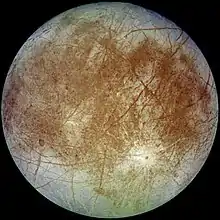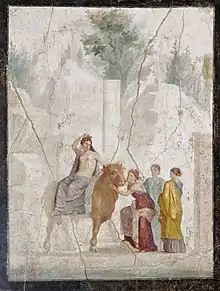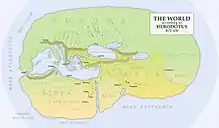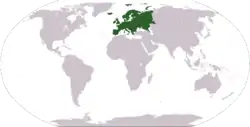Europa
English
Etymology
From Ancient Greek Εὐρώπη (Eurṓpē), a character name in Greek mythology.Doublet of Europe.
Pronunciation
- IPA(key): /jʊˈɹoʊpə/
Audio (file)
Proper noun

Europa
- (Greek mythology) Several characters, most notably a Phoenician princess abducted to Crete by Zeus.
- (astronomy) A moon of Jupiter.
- (astronomy) 52 Europa, a main belt asteroid; not to be confused with the Jovian moon.
Derived terms
- Europan
Related terms
- Europe
- European
Translations
|
|
See also
| Solar System in English · Solar System (layout · text) | ||||||||||||||||||
|---|---|---|---|---|---|---|---|---|---|---|---|---|---|---|---|---|---|---|
| Star | Sun | |||||||||||||||||
| Planets and most likely dwarf planets | Mercury | Venus | Earth | Mars | Ceres | Jupiter | Saturn | Uranus | Neptune | Pluto | ||||||||
| Notable moons | — | Moon | Phobos Deimos | — | Io Europa Ganymede Callisto | Mimas Enceladus Tethys Dione Rhea Titan Iapetus | Miranda Ariel Umbriel Titania Oberon | Triton | Charon Styx Nix Kerberos Hydra | |||||||||
Afrikaans
Etymology
From Dutch Europa.
Pronunciation
Audio (file)
Proper noun
Europa
- Europe
See also
- (continents) kontinent; Afrika, Amerika, Antarktika, Asië, Australië, Europa, Oseanië (Category: af:Continents)
Asturian
Proper noun
Europa f
- Europe
Related terms
- européu
Catalan
Pronunciation
- (Balearic, Central) IPA(key): /əwˈɾo.pə/
- (Valencian) IPA(key): /ewˈɾo.pa/
Audio (file)
Proper noun
Europa f
- Europe
Related terms
- euro
- euro-
- Europa Central
- europeu
See also
- (continents) continent; Àfrica, Amèrica, Amèrica del Nord/Nord-amèrica, Amèrica del Sud/Sud-amèrica, Antàrtida, Àsia, Europa, Oceania (Category: ca:Continents) [edit]
Danish
Etymology
Via Latin Eurōpa from Ancient Greek Εὐρώπη (Eurṓpē)
Pronunciation
- IPA(key): [eˈʁoːpʰa]
Proper noun
Europa
- Europe
Dutch
Etymology
From Middle Dutch europa, from Latin Eurōpa, from Ancient Greek Εὐρώπᾱ (Eurṓpā), Doric form of Εὐρώπη (Eurṓpē).
Pronunciation
- IPA(key): /øːˈroːpaː/, [øˑˈroːpaˑ], [ʏˑˈroːpaˑ]
Audio (file) - Hyphenation: Eu‧ro‧pa
- Rhymes: -oːpaː
Proper noun
Europa n
- The continent Europe
Derived terms
- Europeaan
- Europees
Descendants
- Afrikaans: Europa
- Negerhollands: Juropa
- → Malay: Eropah
- Indonesian: Eropa
Proper noun
Europa f
- (Greek mythology) A Phoenician princess abducted to Crete by Zeus
- A moon of Jupiter
Farefare
Etymology
Learned borrowing in 2021 from Latin Eurōpa, from Ancient Greek Εὐρώπᾱ (Eurṓpā), Doric form of Εὐρώπη (Eurṓpē).
Pronunciation
- IPA(key): /e.u.ɾo.pa/
- Hyphenation: E‧u‧ro‧pa
- Rhymes: -ɾo.pa
Proper noun
Europa
- The continent Europe
Hyponyms
- Albagɔ
- Daŋɔ
- Diiki-dapoore-dutsi
- Dusgo
- Dusgo-peelga
- Dutsgo
- Fãreŋo
- Ɩŋɔ
- Malta
- Polgo
- Portugal
- Sɛkɔ
- Sɛpaŋɔ
- Suis-tẽŋa
- Tɩntɩnnɔ
- Tʋrkɔ
- Ukraigo
Galician
Pronunciation
Audio (file)
Proper noun
Europa
- Europe
- (astronomy) Europa (large moon of Jupiter)
- (astronomy) Europa (asteroid)
- (Greek mythology) Europa (woman seduced by Zeus)
Coordinate terms
- (continents) continente; África, América (Norteamérica/América del Norte, Sudamérica/Suramérica/América del Sur), Antártida, Asia, Europa, Oceanía (Category: es:Continents)
- (moon of Jupiter): Calisto, Ganímedes, Ío
Related terms
- europeo
- Unión Europea
- euro
German
Pronunciation
- IPA(key): /ɔʏ̯ˈʁoːpa/
Audio (Austria) (file) Audio (file)
Proper noun
Europa n (proper noun, strong, genitive Europa or Europas or Europens)
- The continent Europe
- Deutschland liegt im Herzen Europas.
- Germany lies in the heart of Europe.
- The European legal space; the territory characterized by the European Union
Declension
| singular | |||
|---|---|---|---|
| indef. | def. | noun | |
| nominative | ein, eine | das, die | Europa |
| genitive | eines, einer | des, der | Europa, Europas, Europens1 |
| dative | einem, einer | dem, der | Europa |
| accusative | ein, eine | das, die | Europa |
1Now rare.
Coordinate terms
(continents) Erdteil, Kontinent; Afrika, Amerika (Nordamerika, Südamerika), Antarktika, Asien, Europa, Ozeanien (Category: de:Continents)
Related terms
- Europäer
- europäisch
- europäisieren
- Europapolitik
Proper noun
Europa f (genitive Europas or Europa)
- (Greek mythology) A Phoenician princess abducted to Crete by Zeus
- A moon of Jupiter
Further reading
- “Europa” in Digitales Wörterbuch der deutschen Sprache
Ido
Etymology
Borrowed from English Europe, French Europe, German Europa, Italian Europa, Russian Евро́па (Jevrópa), Spanish Europa, ultimately from Latin Eurōpa, from Ancient Greek Εὐρώπη (Eurṓpē).
Pronunciation
- IPA(key): /ew.ˈro.pa/, /ɛw.ˈɾɔ.pa/
Proper noun
Europa
- Europe
Derived terms
- Europana (“European”)
- Europano (“European”)
See also
- (continents) kontinento; Afrika, Amerika (Nord-Amerika, Sud-Amerika), Antarktika, Azia, Australia, Europa (Category: io:Continents)
Interlingua
Proper noun
Europa
- Europe
- Europa
Italian
Etymology
From Latin Eurōpa.
Pronunciation
- IPA(key): /ewˈrɔ.pa/
- Rhymes: -ɔpa
- Hyphenation: Eu‧rò‧pa
Proper noun
Europa f
- (continent) Europe
- Hypernym: Eurasia
- (nautical, sailing, sports) Europe (an olympic sailing class)
- (astronomy, natural satellite) Europa
- (astronomy, asteroid) 62 Europa
- (mythology, Greek mythology) Europa (consort of Zeus, daughter of Agenor)
- (mythology, Greek mythology) Europa (daughter of Oceanus and Tethys)
Related terms
- eurasiatico
- euro-
- euro
- eurocentrismo
- eurocentristico
- eurocity
- eurocomunismo
- eurocomunista
- eurocomunistico
- eurocrate
- eurodeputato
- eurodivisa
- eurodollaro
- euromercato
- euromoneta
- Europa centrale
- Europa meridionale
- Europa occidentale
- Europa orientale
- europarlamento
- Europa settentrionale
- europeismo
- europeista
- europeizzare
- europeo
- europio
- europoide
- euroscudo
- eurosocialismo
- eurosocialista
- eurovisione
See also
- (continents) continente; Africa, America (America meridionale, America settentrionale), Antartide, Asia, Europa, Oceania (Category: it:Continents)
| Solar System in Italian · sistema solare (layout · text) | ||||||||||||||||||
|---|---|---|---|---|---|---|---|---|---|---|---|---|---|---|---|---|---|---|
| Star | Sole | |||||||||||||||||
| Planets and most likely dwarf planets | Mercurio | Venere | Terra | Marte | Cerere | Giove | Saturno | Urano | Nettuno | Plutone | ||||||||
| Notable moons | — | Luna | Fobos Deimos | — | Io Europa Ganimede Callisto | Mimas Encelado Teti Dione Rea Titano Giapeto | Miranda Ariel Umbriel Titania Oberon | Tritone | Caronte Stige Notte Cerbero Idra | |||||||||
Latin


Alternative forms
- Eurōpē
Etymology
From Ancient Greek Εὐρώπᾱ (Eurṓpā).
Pronunciation
- (Classical) IPA(key): /eu̯ˈroː.pa/, [ɛu̯ˈroːpä]
- (Ecclesiastical) IPA(key): /eu̯ˈro.pa/, [eu̯ˈrɔːpä]
Audio (Classical) (file)
Proper noun
Eurōpa f sg (genitive Eurōpae); first declension
- (Greek mythology) Europa (daughter of Phoenician king Agenor who was abducted by Jupiter and carried to Crete)
- Europe
- 43, Pomponius Mela, De situ orbis, book 1, chapter 3:
- Brevis Europae descriptio.—Europa terminos habet, ab oriente Tanain et Maeotida et Pontum; a meridie reliqua nostri maris; ab occidente Atlanticum; a septentrione Britannicum oceanum. (genitive and nomitive cases)
- A brief description of Europe.—Europe's borders, on the east are Tanais, Maeotida, and Pontus; on the south, the rest of our sea; on the west, the side of the Atlantic; north of the British Ocean.
- ca. 415, Martianus Capella, De nuptiis Philologiae et Mercurii, book 6, section 661:
- Quartus vero et magnus Europae sinus ab Hellesponto incipiens Maeotis ostio terminatur. Nam arctum mare inter Europam et Asiam in angustias septem stadiorum interfluens coarctatur; quas angustias Hellespontum dicunt, ubi Xerxes Persidis rex aggregatis navibus ponteque constructo exercitum duxit. (genitive and accusative cases)
- The fourth and great bay of Europe, beginning from the Hellespont, terminates at the mouth of the Maeotis. For the narrow sea flowing between Europe and Asia is confined to a narrow strip of seven furlongs; which they call the narrows of the Hellespont, where Xerxes, king of the Persians, assembled his ships and led his army under a bridge.
- 43, Pomponius Mela, De situ orbis, book 1, chapter 3:
- (New Latin, astronomy) Europa (moon of Jupiter)
- (New Latin, astronomy) 52 Europa (main belt asteroid)
Declension
First-declension noun, singular only.
| Case | Singular |
|---|---|
| Nominative | Eurōpa |
| Genitive | Eurōpae |
| Dative | Eurōpae |
| Accusative | Eurōpam |
| Ablative | Eurōpā |
| Vocative | Eurōpa |
Derived terms
- Eurōpaeus (“of Europa, of Europe”, adjective)
- Eurōpēnsis (“of Europe”, adjective)
Descendants
- → Bulgarian: Европа (Evropa)
- Catalan: Europa
- → Middle English: Europe
- English: Europe, Europa (see there for further descendants)
- Scots: Europe
- → Dutch: Europa
- → Indonesian: Eropa
- French: Europe
- → German: Europa
- Italian: Europa
- → Sicilian: Europa
- → Turkish: Avrupa
- → Mandarin: 歐羅巴/欧罗巴
- Portuguese: Europa
- → Japanese: ヨーロッパ (Yōroppa)
- Romanian: Europa
- Sicilian: Aurupa
- Spanish: Europa
- → Russian: Европа (Jevropa)
References
- “Europa”, in Charlton T. Lewis and Charles Short (1879) A Latin Dictionary, Oxford: Clarendon Press
- “Europa”, in The Perseus Project (1999) Perseus Encyclopedia
- “Europa”, in Harry Thurston Peck, editor (1898) Harper's Dictionary of Classical Antiquities, New York: Harper & Brothers
- “Europa”, in William Smith, editor (1848) A Dictionary of Greek Biography and Mythology, London: John Murray
- “Europa”, in William Smith, editor (1854, 1857) A Dictionary of Greek and Roman Geography, volume 1 & 2, London: Walton and Maberly
Lithuanian

Proper noun
Europa f
- Europe (continent)
Declension
| nominative | Europa |
|---|---|
| genitive | Europos |
| dative | Europai |
| accusative | Europą |
| instrumental | Europa |
| locative | Europoje |
| vocative | Europa |
Related terms
- europietis m, europietė f
Norwegian Bokmål
Etymology
From Latin Europa, from Ancient Greek Εὐρώπη (Eurṓpē).
Proper noun
Europa
- Europe (continent)
- Hun kan alle hovedstedene i Europa.
- She can name all the capitals in Europe.
- Hun kan alle hovedstedene i Europa.
Derived terms
|
|
|
Related terms
- europeisk
- europeer
See also
- (continents) kontinent; Afrika, Amerika, Antarktis, Asia, Europa, Nord-Amerika, Oseania, Sør-Amerika (Category: no:Continents)
References
- “Europa” in The Ordnett Dictionary
- Douglas Harper (2001–2023), “Europe”, in Online Etymology Dictionary.
Norwegian Nynorsk
Etymology
From Latin Europa, from Ancient Greek Εὐρώπη (Eurṓpē).
Proper noun
Europa
- Europe (continent)
- Ho kan alle hovudstadene i Europa.
- She can name all the capitals in Europe.
- Ho kan alle hovudstadene i Europa.
Derived terms
|
|
|
Related terms
- europeisk
- europear
Polish
Etymology
Borrowed from Latin Eurōpa, from Ancient Greek Εὐρώπη (Eurṓpē).
Pronunciation
- IPA(key): /ɛwˈrɔ.pa/
Audio (file) - Rhymes: -ɔpa
- Syllabification: Eu‧ro‧pa
Proper noun
Europa f
- Europe
- Europa Północna ― Northern Europe
- Europa
Declension
| singular | |
|---|---|
| nominative | Europa |
| genitive | Europy |
| dative | Europie |
| accusative | Europę |
| instrumental | Europą |
| locative | Europie |
| vocative | Europo |
Derived terms
- euro
- Europejczyk
- Europejka
- europejski
Further reading
- Europa in Wielki słownik języka polskiego, Instytut Języka Polskiego PAN
- Europa in Polish dictionaries at PWN
Portuguese
Pronunciation
- (Brazil) IPA(key): /ewˈɾɔ.pɐ/ [eʊ̯ˈɾɔ.pɐ]
- (Southern Brazil) IPA(key): /ewˈɾɔ.pa/ [eʊ̯ˈɾɔ.pa]
- (Portugal) IPA(key): /ewˈɾɔ.pɐ/
Proper noun
Europa f
- Europe (a continent)
- (Greek mythology) Europa (Phoenician princess)
- (astronomy) Europa (moon of Jupiter)
Quotations
For quotations using this term, see Citations:Europa.
Related terms
- Eurafrásia
- Eurásia
- euro
- euro-
- europeísmo
- europeizar
- europeu
- európio
Descendants
- → Japanese: ヨーロッパ (Yōroppa)
Romanian
Pronunciation
- IPA(key): /e.uˈro.pa/
Proper noun
Europa f
- Europe (a continent)
- Europa (goddess)
- Europa (moon of Jupiter)
Declension
| singular | ||
|---|---|---|
| f gender | indefinite articulation | definite articulation |
| nominative/accusative | (o) Europă | Europa |
| genitive/dative | (unei) Europe | Europei |
| vocative | Europă, Europo | |
Related terms
- Europa Centrală
- Europa de Est
- Europa de Nord
- Europa de Sud
- Europa de Vest
- european
Romansch
Etymology
From Latin Eurōpa, from Ancient Greek Εὐρώπη (Eurṓpē).
Proper noun
L'Europa f
- (geography) Europe
- (astronomy) Europa
Serbo-Croatian
Alternative forms
- Evrópa (Bosnian, Serbian)
Pronunciation
- IPA(key): /eurǒːpa/
- Hyphenation: E‧u‧ro‧pa
Proper noun
Európa f (Cyrillic spelling Еуро́па)
- (Croatia) Europe
- (Croatia) Europa
Declension
| singular | |
|---|---|
| nominative | Europa |
| genitive | Europe |
| dative | Europi |
| accusative | Europu |
| vocative | Europo |
| locative | Europi |
| instrumental | Europom |
Sicilian
Alternative forms
- Aurupa, Arupa (archaic form)
- Eurupa, Iurupa (modern sicilianization)
Etymology
Borrowed from Latin Eurōpa. Doublet of Sicilian Aurupa.
Pronunciation
- IPA(key): /ɛwˈɾɔ.pa/ (Standard)
- IPA(key): /ɪwˈɾu.pa/ (sicilianized)
- Hyphenation: Eu‧rò‧pa
Proper noun
Europa f
- (continent) Europe (the portion of Eurasia west of the Urals, traditionally considered a continent in its own right, located north of Africa, west of Asia and east of the Atlantic Ocean)
- Hypernym: Euràsia
- (astronomy, natural satellite) Europa
- (astronomy, asteroid) 62 Europa
- (mythology, Greek mythology) Europa (consort of Zeus, daughter of Agenor)
- (mythology, Greek mythology) Europa (daughter of Oceanus and Tethys)
Derived terms
- Europa cintrali
- Europa dû Norti
- Europa dû Sud
- Europa livantina
- Europa miridiunali
- Europa punintina
- Europa sittintriunali
- eurupea
- eurupeu
Related terms
- Uniuni Eurupea
- euru
- euro
Spanish
Pronunciation
- IPA(key): /euˈɾopa/ [eu̯ˈɾo.pa]
- Rhymes: -opa
- Syllabification: Eu‧ro‧pa
Proper noun
Europa f
- Europe (the portion of Eurasia west of the Urals, traditionally considered a continent in its own right, located north of Africa, west of Asia and east of the Atlantic Ocean)
- (astronomy) Europa (large moon of Jupiter)
- (astronomy) Europa (asteroid)
- (Greek mythology) Europa (woman seduced by Zeus)
Derived terms
- Europa del Norte
- Europe Central
- Picos de Europa
Related terms
- europeo
- Unión Europea
- euro
Descendants
- → Burmese: ဥရောပ (u.rau:pa.)
See also
- (continents) continente; África, América (Norteamérica/América del Norte, Sudamérica/Suramérica/América del Sur), Antártida, Asia, Europa, Oceanía (Category: es:Continents)
Further reading
- “Europa”, in Diccionario de la lengua española, Vigésima tercera edición, Real Academia Española, 2014
Swedish
Etymology
Ultimately from Ancient Greek Εὐρώπα (Eurṓpa).
Pronunciation
- IPA(key): /ɛˈruːpa/
Proper noun
Europa n (genitive Europas)
- Europe, the westernmost part of the Eurasian continent, north of Africa and west of Asia
Related terms
- europeisk
- europeiska
- euro
- europé
Proper noun
Europa c (genitive Europas)
- Europa (goddess)
- Europa, a moon of Jupiter
Tagalog
Alternative forms
- Yuropa
Etymology
Borrowed from Spanish Europa.
Pronunciation
- Hyphenation: Eu‧ro‧pa
- IPA(key): /juˈɾopa/, [jʊˈɾo.pɐ]
- IPA(key): /ʔeuˈɾopa/, [ʔeʊˈɾo.pɐ] (obsolete)
Proper noun
Europa (Baybayin spelling ᜌᜓᜇᜓᜉ or ᜁᜂᜇᜓᜉ)
- Europe (a continent)
Related terms
- Europea
- Europeo
References
- “Europa”, in Pambansang Diksiyonaryo | Diksiyonaryo.ph, Manila: Komisyon sa Wikang Filipino, 2018